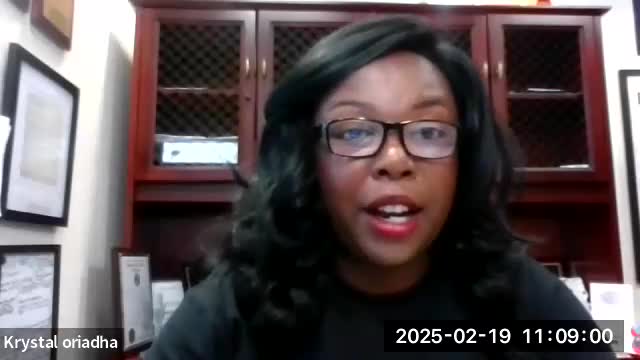Prince George's County work group concentrates on programs, mentorship and mental‑health access to curb gun violence
Get AI-powered insights, summaries, and transcripts
Subscribe
Summary
County gun‑violence work group discussed school prevention, mentoring/credible messengers, juvenile pretrial gaps, mental‑health access, gun buybacks and youth‑led campaigns and agreed to collect more data and solicit presentations to refine recommendations.
Prince George's County's gun‑violence work group on a recorded virtual meeting focused its session on programs and initiatives aimed at preventing gun violence and supporting impacted families, with members pitching school‑based prevention, mentorship and credible‑messenger models, expanded mental‑health services, targeted pilot projects and buyback events.
The meeting chair, who opened the session by thanking participants for contributing to “taking a long look at the issues we're seeing around gun violence here in Prince George's County,” said the group would concentrate that day on programs and initiatives and directed members to a shared document to record and color‑code recommendations for follow up.
Why it matters: work group members said programmatic responses can be implemented more quickly than some policy changes and can target young people and neighborhoods at higher risk. Several participants urged pairing short‑term pilots with long‑term steps such as curriculum changes and data‑driven targeting so limited funds go where they can have the greatest effect.
Discussion highlights
School‑based prevention: The chair proposed school programs teaching emotional regulation, nonviolent communication and conflict resolution, estimating an initial cost “somewhere between, dollars 10 to 50,000 depending upon if this is a volunteer, based program or, if it's a program we have to hire, new staff or hire or contract out to, nonprofits.” Several members recommended starting with nonprofit partners or college interns so programs could launch within months rather than waiting for curriculum approval, which one participant said could take “a year and a half.” The work group asked the Prince George's County Public Schools for an inventory of existing programming and gaps.
Mentorship and credible messengers: Participants distinguished between volunteer mentors and paid ‘‘credible messenger’’ or navigator models that provide intensive, sustained engagement. Lisa Gary, Deputy Secretary for Community Services, Department of Juvenile Services, said credible messengers "have a different relationship and bond with young people," and warned that truly effective programs require investment rather than relying solely on volunteers. A representative described local efforts that pay organizations to employ credible messengers who serve as brokers, mediators and coaches for youth and families.
Juvenile pretrial gap: Officials flagged a service gap for youth arrested for serious charges who remain in the system long before adjudication. One speaker who reviewed case files said delays of six to nine months between arrest and disposition left many youths without rehabilitative services during a period when they sometimes “pick up new charges.” The state's attorney's office offered to share data and partner on analysis to identify where early interventions could be offered pre‑adjudication.
Mental‑health access for survivors and families: Members discussed limited availability of long‑term, low‑cost mental‑health services for families and survivors of gun violence. The chair noted existing options such as Hazel Health in schools and recalled a past “Survivors of Homicide” group run as a contractor‑led support group. Shawna Wadia, of the Prince George's County Police Department victim services, said the department works with Roberta's House and Covenant Place and offered to gather details on the scope and capacity of those providers.
Gun buybacks and youth campaigns: Police described past buyback events funded largely by community and faith groups with police handling collection and destruction. Law enforcement said buybacks typically draw firearms from law‑abiding citizens and older weapons rather than necessarily removing weapons held by people likely to commit violent crimes. The group also discussed youth‑led anti‑violence campaigns and recommended recruiting youth to design messaging while protecting participants from frontline outreach that could place them at risk.
Next steps and follow up: The work group asked staff to collect example program budgets, invite presentations from credible‑messenger organizations (including CM3 and local groups being vetted), request data analyses used in other cities to target interventions, and compile information on existing mental‑health providers and capacity. The chair scheduled the next meeting for March 19 and asked members to add further recommendations to the shared document ahead of the group’s policy‑focused meeting.
Quotes
"Every major statistic as it relates to crime is down in Prince George's County," said Perry Paley, deputy state's attorney, while urging the group to build on recent collaborative efforts.
"It's not solely about mentoring...Credible messengers have a different relationship and bond with young people," said Lisa Gary, Deputy Secretary for Community Services, Department of Juvenile Services, arguing for paid, sustained models rather than wholly volunteer programs.
Formal actions and procedural items
The work group approved minutes from the prior meeting by unanimous consent after a motion to approve was made and seconded; no roll‑call vote was recorded. The group set March 19 as its next meeting date and directed staff to collect and share requested materials and presentations.
Ending
Members emphasized piloting programs in a limited number of schools or neighborhoods, using data to target resources, and pairing short‑term nonprofit partnerships with longer‑term curriculum or systems changes. Several speakers offered data‑sharing and presentation commitments; the work group will review those materials before moving to policy recommendations at its next meeting.
